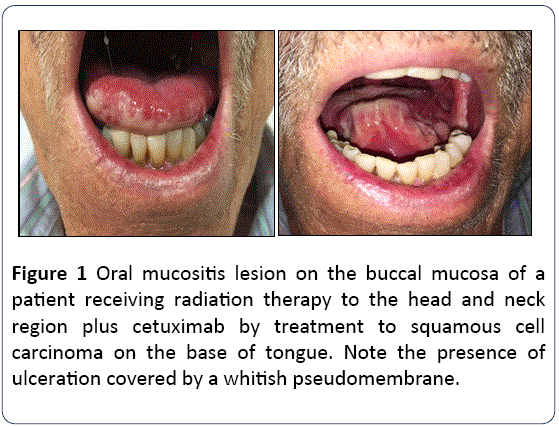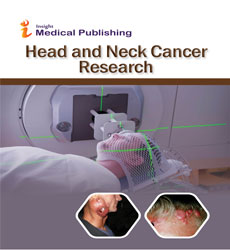Radiation Plus Cetuximab Induced Severe Oral Mucositis
Victor Domingos Lisita Rosa, Ana Carolina da Costa Ferreira and Hortencia Lopes de Souza Lisita
DOI10.21767/2572-2107.100021
Victor Domingos Lisita Rosa1,2, Ana Carolina da Costa Ferreira2 and Hortencia Lopes de Souza Lisita3
1Oncovida - Center of Oncology, Goias, Brazil
2School of Medicine, Union of Colleges Alfredo Nasser - UNIFAN, Goias, Brazil
3Federal University of Goias, Brazil
- *Corresponding Author:
- Rosa VDL
Oncovida - Center of Oncology, Goias, Brazil
Tel: 55623996-8500
E-mail: victor_lisita@yahoo.com.br
Received Date: 16 December 2017; Accepted Date: 19 December 2017; Published Date: 26 December 2017
Citation: Rosa VDL, Ferreira ACC, Lisita HLS (2018) Radiation Plus Cetuximb Induced Severe Oral Mucositis. Head Neck Cancer Res. Vol.2 No.2:6. DOI: 10.21767/2572-2107.100021
Copyright: © 2017 Rosa VDL, et al. This is an open-access article distributed under the terms of the Creative Commons Attribution License, which permits unrestricted use, distribution, and reproduction in any medium, provided the original author and source are credited.
Clinical Image
A 72-year-old male with squamous cell carcinoma on the base of tongue diagnosed by biopsy an 2017. Radical surgical treatment was proposed but the patient refused and preferred systemic therapy with induction chemotherapy using docetaxel, cisplatin, and fluorouracil followed by radiotherapy plus cetuximab.
After five sessions of radiotherapy and one cycle of cetuximab the patient returned with a pain in the mouth and throat, difficulty swallowing and talking, feeling of dryness, mild burning, red and swollen gums, hicker saliva in the mouth and whitish patches on the tongue surrounding erythematous area (Figure 1). Radiotherapy was temporarily suspended until full recovery. When restarted the treatment, he again had severe mucositis (grade 3) induced by cetuximab, and in this moment the drug definitely excluded. Then, the patient completed treatment with only radiotherapy and had good tolerance.
Cetuximab is an epidermal growth factor receptor (EGFR) inhibitor used for the treatment of advanced metastatic colorectal cancer and head and neck cancer. It is a chimeric monoclonal antibody and when combined with radiotherapy increases in the treatment-related toxicity. Toxicities can include oral mucositis, dysphagia, pain and skin reactions. Excessive toxicity of mucosa causes the treatment interruption sometimes, impairing the effectiveness of the treatment and sometimes the patient does not receive the full course of combined therapy. The patient received treatment with oral hygiene protocols, benzidamine, cryotherapy and daily laser therapy. Besides that, it is very important reinforcing the importance of good oral care throughout cancer treatment.
Open Access Journals
- Aquaculture & Veterinary Science
- Chemistry & Chemical Sciences
- Clinical Sciences
- Engineering
- General Science
- Genetics & Molecular Biology
- Health Care & Nursing
- Immunology & Microbiology
- Materials Science
- Mathematics & Physics
- Medical Sciences
- Neurology & Psychiatry
- Oncology & Cancer Science
- Pharmaceutical Sciences

